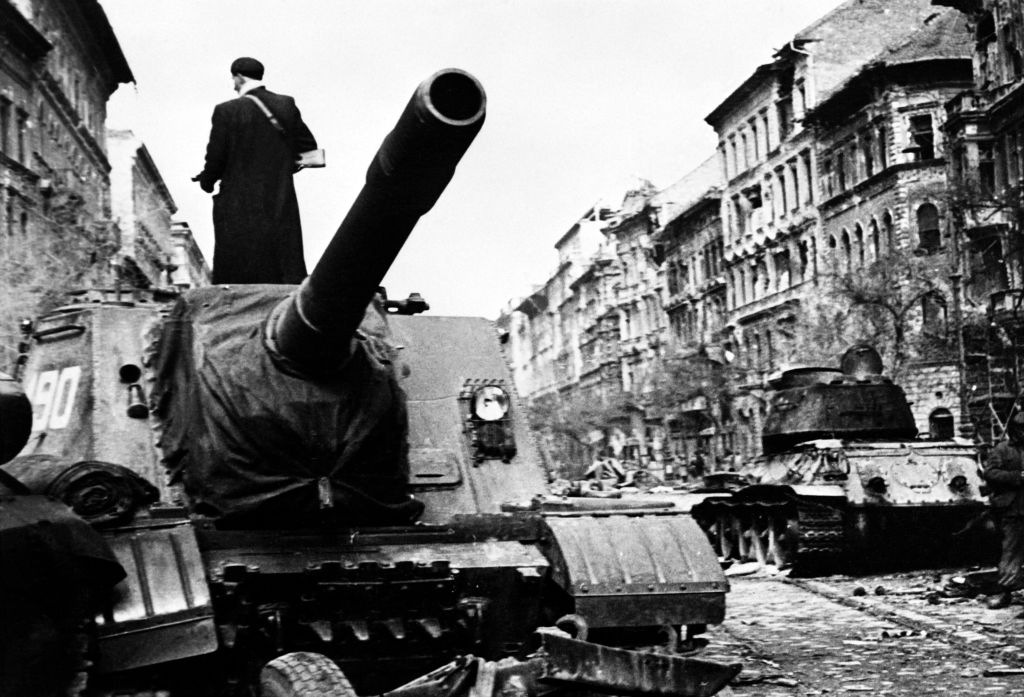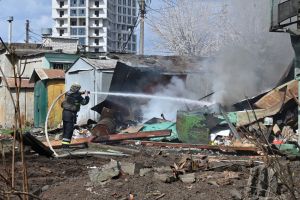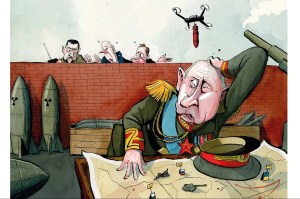By now, my colleagues in the media may have convinced you that Russia’s invasion of Ukraine has been a “transformative” event, a challenge by a reactionary dictator to the “liberal international order,” if not an end to one historical epoch and the beginning of a new one. The world has turned upside down, nothing will again be the same, blah, blah, blah.
When millennials make such apocalyptic observations, I can understand. Like Founding Father Thomas Paine, they assume that each day marks the “birthday of a new world.” But what about baby boomers like New York Times columnist Tom Friedman, who were in high school in 1956 during the so-called Hungarian Revolution, which was very much like what is happening in Ukraine today?
Back then, popular resistance against Russian military power was applauded in the West and encouraged by Voice of America and the CIA, while American officials and pundits predicted the collapse of the Soviet Union. The brave Hungarians and their Western supporters even had their own Volodymyr Zelensky-like hero, Imre Nagy, Time’s Man of the Year in 1956, who led the struggle against the Soviets and ignited hope that the good guys might win and the world might begin anew.
Had he followed these events, young Friedman would have later learned about the tragic end of the Hungarian uprising, which was repressed by the Soviet military and which killed 2,500 Hungarians and compelled 200,000 Hungarians to seek political refuge abroad.
“All these people are getting killed and we weren’t doing anything, we were ignoring them,” said Frank Wisner, then a top CIA official who recalled spending a lot of effort “to get these people to revolt.”
So why didn’t the Americans do the right thing and send military troops to help the Hungarians defeat the Soviet occupiers? Well, boys and girls, both the Americans and the Soviets had atomic weapons. Washington decided that risking a nuclear exchange with the Russians that could lead to the obliteration of American cities in order to save the Hungarians was not in America’s national interest.
A rerun of 1956 happened in 1968 during the so-called Prague Spring when reformist leaders in Czechoslovakia led by another brave man, Alexander Dubcek, challenged Moscow, only to face Soviet tanks that invaded the country to suppress the reforms.
By then in college, Friedman would have known what happened next: Czechoslovakia, like Hungary and Poland, was in the Soviet sphere of influence as agreed upon at the 1945 Yalta Conference. That meant that Moscow would not tolerate any American military intervention. So in the West they wrote songs about the Prague Spring and idolized its leaders, some of whom returned to the scene after the Soviets got what they deserved and their empire collapsed peacefully in 1989.
In fact, change did happen thanks to what in retrospect should probably be seen not as a triumph of a liberal democratic crusade but the rise of nationalism in the former Czechoslovakia and Yugoslavia, Poland, Hungary and Russia.
An economically bankrupt and militarily weakened Russia was no longer in a position to globally counterbalance the Americans. Lacking the diplomatic-military weight it had once thrown around, in 1991, the Russians were not able to prevent President George Bush I from attacking their Iraqi ally, Saddam Hussein, forcing him out of Kuwait. They also — unfortunately! — they failed to avert a disastrous American invasion of Iraq under George Bush II.
But things seemed to revert to normal, at least from the Russian perspective, when under President Vladimir Putin they were able to employ their revitalized power to help save their Syrian ally, Bashar al-Assad, and prevent direct US military intervention in Syria, a country that for all practical matter has been transformed into a Russian protectorate.
In international relations, crises, usually in the form of wars, tend to expose shifts in the balance of power. The British Empire was in sharp decline after World War II, but only the 1956 Suez War made it clear that it was no more.
Hence in the aftermath of the wars in Iraq and Afghanistan, we began to recognize that post-Cold War American hegemony in the Middle East was over, marking a major challenge to American global supremacy and the beginning of an evolution towards a more multipolar international system.
From that perspective, President Barack Obama’s failure to impose those famous “red lines” after Syria’s use of chemical weapons was less a form of appeasement than a recognition of the limited options that were available to the US in Syria now that Russia had returned to play an active military role. The deal with Damascus facilitated by Russia was an attempt by Putin to allow Obama to save face.
The reality is that an economically revitalized and militarily reinvigorated Russia is now in the position not to re-establish the old Soviet Empire but to return to at least some of the elements of the old international status quo when as a major nuclear military power it was in a position to check the global ambitions of the US.
Putin understood early on that the idea of a new Yalta Conference, one that would ensure that Russia maintained its sphere of influence in Europe, was not workable. So instead he responded to the expansion of NATO by using military power to check the alliance’s advancements in Georgia and Ukraine.
And — surprise surprise! — in both cases, not unlike in Hungary in 1956 and Czechoslovakia in 1968, the US refrained from threatening to use its military power in response.
In a way, Putin recognized that the Soviet Union had succeeded in establishing its spheres of influence in Europe in 1945 only because of its military victory in World War II and its occupations of Poland, Hungary, Czechoslovakia and the Baltic states.
Thus does his decision to attack Ukraine stem from his conclusion that only the use of military power would allow him to protect what he considers to be legitimate Russian strategic interests even in the face of punishing Western economic sanctions.
And here we are once again applauding — and rightly so! — the bravery of those who insist on preserving their independence and condemning aggressive moves by a great power. Such is the sad reality of international relations when our ability to shape the world based on our interests and values is constrained.


















